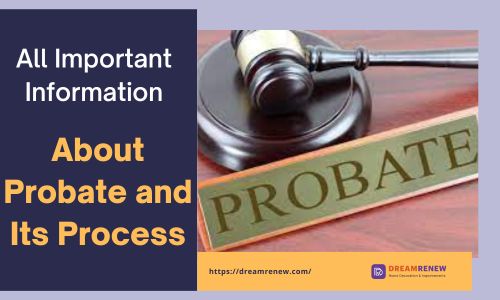Learn all information about probate and preprobate as well as the legal process of probate house or property according to united state
What is Probate Property?
Probate property refers to assets and possessions that become subject to the probate process when an individual passes away. These assets typically include real estate, bank accounts, personal belongings, investments, and any other valuable items that do not have a designated beneficiary or joint owner. Essentially, probate property is the part of an individual’s estate that needs to go through legal proceedings to ensure its proper distribution according to the person’s will or state laws, and to resolve any potential claims or disputes related to the estate.

What is The Purpose of Probate?
The primary purpose of probate is to ensure the fair and lawful distribution of a deceased person’s assets and estate. This legal process serves several important functions:
• Validating the Will: Probate confirms the authenticity of the deceased person’s will. This involves verifying that the document is legally sound and that the individual had the mental capacity to create it.
• Debt Settlement: Probate allows for the orderly payment of the deceased person’s debts, including outstanding loans, taxes, and other financial obligations. Creditors have an opportunity to make claims against the estate during this process.
• Asset Distribution: The court oversees the distribution of assets to the beneficiaries and heirs as specified in the will or according to state laws if there is no will. This ensures that assets are divided equitably among the rightful recipients.
• Legal Protection: Probate provides legal protection to all parties involved, including beneficiaries, creditors, and the executor or administrator of the estate. It ensures that the process is conducted according to established rules and regulations.
• Resolution of Disputes: If there are disputes or challenges regarding the will or the distribution of assets, probate provides a forum for addressing and resolving these issues in a fair and orderly manner.
What Questions are Asked at a Probate Hearing?
During a probate hearing, questions typically focus on the authenticity of the will, the mental capacity of the deceased when creating the will, the appointment of the executor, any creditor claims, beneficiary identification, and the inventory and distribution of assets. These questions are essential to validate the will and ensure a fair and legal distribution of the deceased person’s estate.
What is Probate Process
The probate process is a legal procedure that occurs after an individual’s death to settle their estate. It involves several key stages:
- Filing the Will: The process often begins with the filing of the deceased person’s will with the probate court. If there is no will, the court follows state laws for intestate succession.
- Notification: Beneficiaries, heirs, and creditors are notified of the probate proceedings. Public notice may be given to alert potential creditors.
- Inventory and Appraisal: The estate’s assets, including real estate, personal property, and financial accounts, are inventoried and appraised to determine their value.
- Debt Payment: Outstanding debts, including taxes, loans, and other financial obligations, are paid from the estate’s assets.
- Creditor Claims: Creditors have an opportunity to submit claims against the estate during a specified period.
- Asset Management: The executor or administrator manages the assets and property of the estate, making decisions about their sale or distribution.
- Beneficiary Distribution: Once debts and taxes are settled, the remaining assets are distributed to the beneficiaries or heirs as specified in the will or according to state laws.
- Final Accounting: An account of all financial transactions and asset distribution is provided to the court and interested parties.
- Closing the Estate: After the court approves the final accounting, the estate is officially closed, and the probate process is complete.

How Long Does it Take to Probate a Will?
it takes a minimum of 6 months to accurately determine and resolve the decedent’s remaining debts payable on death.
How Long Does Probate Take?
its take six month to 1 year approximately.
How Long Do You Have to File Probate After Death?
You can usually wait about a week after the funeral to start the probate process for the will. It’s a good idea to begin the initial steps within 30 days after the person has passed away. If you have any questions, don’t hesitate to call your lawyer or the local Circuit Court Clerk’s Office for help.
When is Probate Required?
Probate is required when someone passes away and they have assets that don’t have a clear beneficiary or co-owner. It helps make sure those assets are distributed fairly.
What Happens to a House During Probate?
A house in probate may be sold to pay debts or given to beneficiaries. It depends on the will or state laws.
Who Owns a House During Probate?
The house is owned by the deceased person’s estate during probate. The executor or administrator manages it.
What is Preprobate?
Preprobate is planning before someone passes away. It can include making a living trust to avoid probate for some assets.
What are the Disadvantages of Probate?
Probate can be expensive, take a long time, and it’s often a public process. It may also lead to conflicts among family members.
What are the Advantages of Probate Process?
Probate provides a legal framework to ensure assets are distributed correctly and disputes are resolved. It offers protection and oversight.
Related Topic: Comprehensive Guide to Distressed Properties
Conclusion
Probate is a legal process that helps ensure the fair and lawful distribution of a deceased person’s assets. It serves to validate the will, settle debts, and protect the interests of beneficiaries and creditors. Probate involves a series of steps, from filing the will to closing the estate, and typically takes about six months to a year to complete. It’s important to initiate the probate process within 30 days after the person’s passing, and it’s often required when there are assets without clear beneficiaries. A house in probate may be sold or given to beneficiaries, and the ownership lies with the deceased person’s estate during this process.
Frequently Asked Questions
Q1: What happens if you don’t file probate in California?
If you don’t file for probate in California when it’s required, the deceased person’s assets may remain inaccessible. This can lead to legal complications, delayed distribution of assets, and potential financial issues for beneficiaries.
Q2: How to claim the estate of the deceased?
To claim the estate of a deceased person, you typically need to follow these steps:
- Determine if you’re a beneficiary or heir.
- Locate the will, if one exists, and gather necessary documents.
- Petition the court for probate if required.
- Follow the probate process, including settling debts and distributing assets.
Q3: What is probate estate?
The probate estate comprises the assets and property of a deceased person that must go through the probate process. This typically includes real estate, bank accounts, personal belongings, and other assets without designated beneficiaries.
Q4: What is a probate sale?
A probate sale is the sale of property from a deceased person’s estate as part of the probate process. It often involves selling real estate to settle debts or distribute assets to beneficiaries.
Q5: How to Sell a House During Probate:
- To sell a house during probate, follow these steps:
- Petition the court for permission to sell the property.
- Obtain an appraisal or valuation of the house.
- Hire a real estate agent or broker to list the property.
- Market and sell the property, typically with court approval.
- Proceed with the sale, pay off debts, and distribute the proceeds as per the court’s instructions.
Selling a house during probate can be a complex process, and it’s advisable to seek legal counsel or the guidance of a real estate professional experienced in probate sales to ensure a smooth transaction.
Next Topic: What is House Flipping




